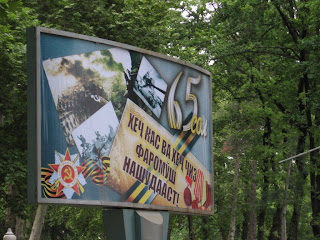





This month marks the 65th anniversary of the end of World War II in Europe. In the former Soviet Union, the day is celebrated on May 9th as Victory Day. Although sadly there are fewer and fewer members of the WWII generation with us, the collective memory lingers, particularly in countries where the war was fought on their own soil. I doubt there is a town of any size in the former USSR that does not have its own memorial. The city of Leningrad (now St. Petersburg) was under siege by the Nazi army for 900 days--nearly 3 years. Young men were recruited from all over the Soviet Union, including a large number of young men from Tajikistan, many of whom had never been beyond the mountains they could see from their home village. In a couple of museums here I've seen a display of pictures of elderly WWII veterans (see photo of the display in Khujand).
Yesterday one TV station showed an event in Kalingrad, Russia where thousands of young cadets stood at attention as a general in an open Jeep rode 20 meters, stopped, and proclaimed through a loudspeaker something to the effect of "We celebrate the 65th anniversary of the end of the Great Patriotic War." The cadets responded in chorus with a short chant, the Jeep drove another 20 meters, and the same thing was repeated. On another station, another parade was shown where hordes of white-haired men and women with dozens of medals on their chests walked through the streets.
My upstairs neighbor is a medalist, as they call them. "Babushka" (Russian for "grandmother) was a telegraph operator here in Dushanbe during the war, and has several medals to commemorate her service. A couple weeks ago I saw her older medals, and now she has a new 65 year medal that she has been wearing proudly. I tried to communicate to them that my Grandpa also worked in radio communications for the US Army, and that he was in Germany during the war. Babushka's husband, now deceased, went into the Red Army at age 17 and drove a tank in the war. Yesterday Babushka's daughter Lena showed me pictures of her father in his uniform and of the tank with branches strapped to it as camo. We all have stories, but I especially love spending time with older people who have seen so much history. I wish I could ask Babushka more questions, but she doesn't speak Tajik, the language I opted to take classes in.
After the picture of the Khujand heroes is: the Norak memorial, the Khujand memorial, me and Babushka, the commemorative signs around town in Tajik saying "no one and nothing will be forgotten," and the Dushanbe memorial with a Soviet tank.

Very interesting, Bethany. Thanks for sharing!
ReplyDeletereally interesting to read. Thanks!
ReplyDelete